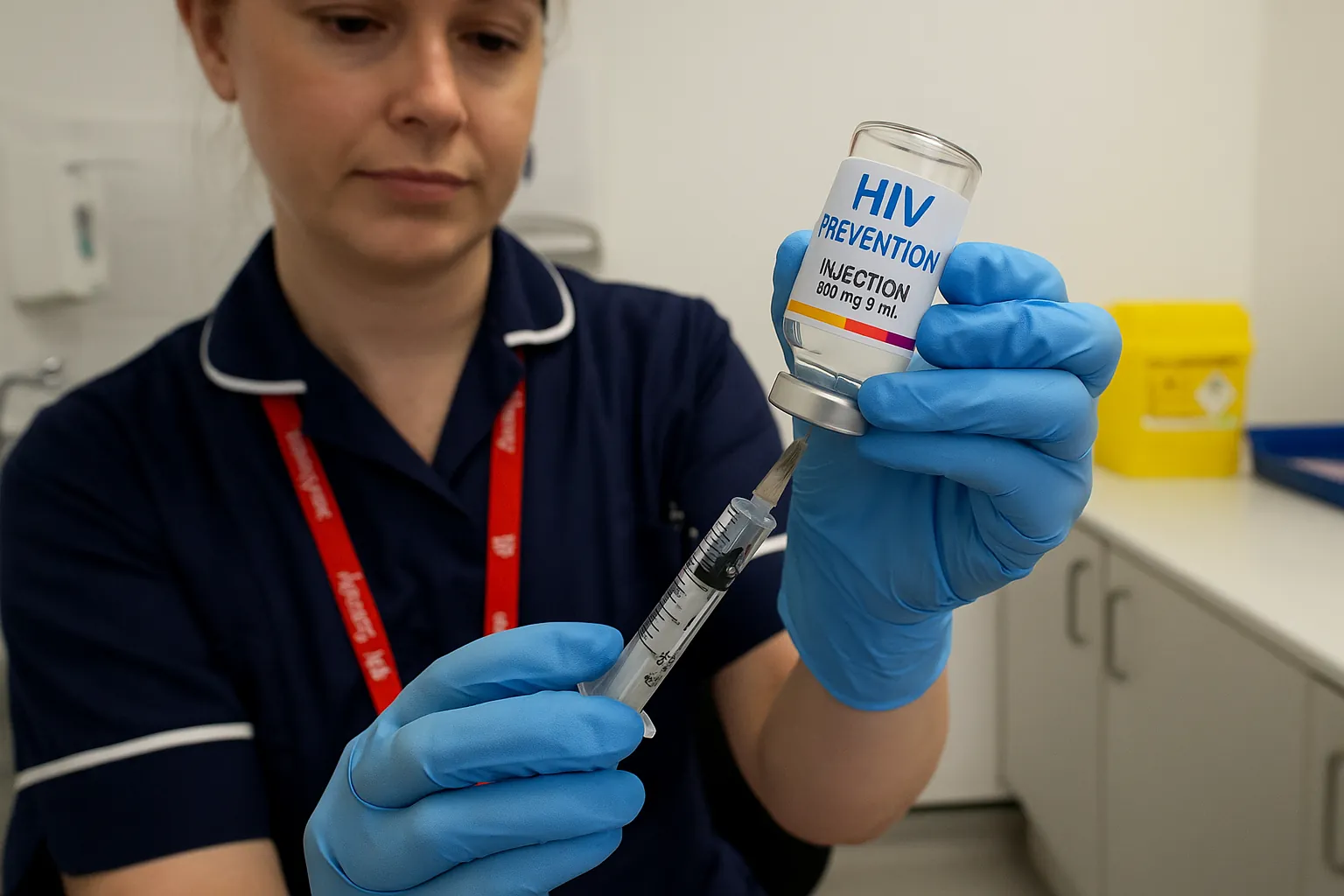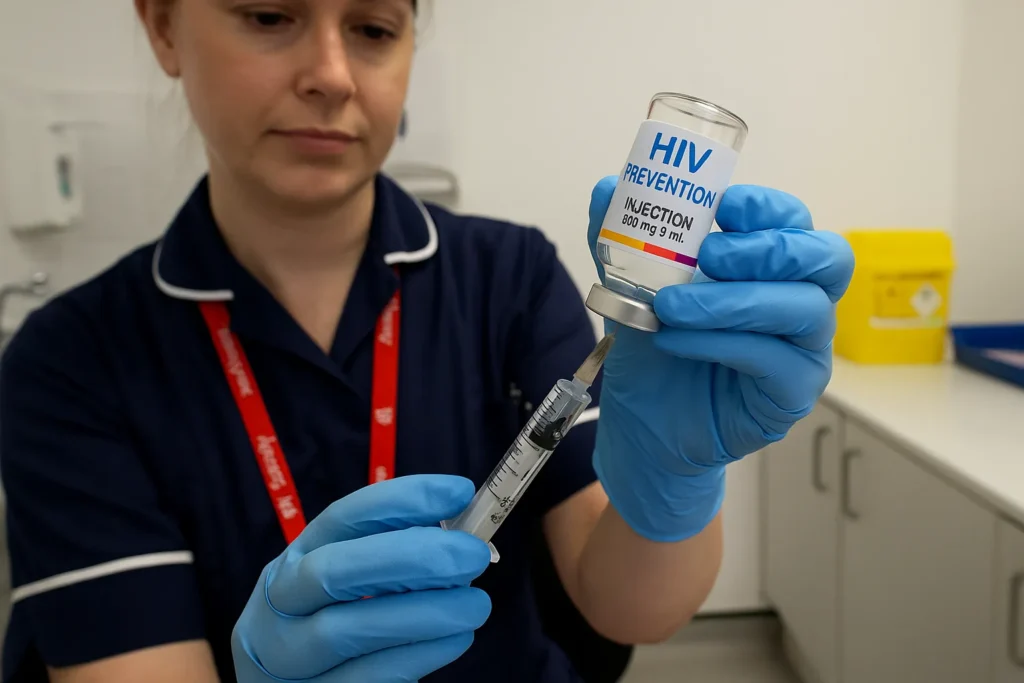The approval of a long-awaited HIV prevention jab in England and Wales marks more than just a medical milestone — it’s a cultural one. For the first time, health authorities are set to endorse a treatment that can protect against HIV through a simple injection every few months, a dramatic step beyond daily pills and decades of fear. But the real challenge won’t be scientific. It will be social: ensuring access, defeating stigma, and rebuilding public trust in a health system that has often left the most vulnerable behind.
Context: the science behind the hope
The National Institute for Health and Care Excellence (NICE) is expected to approve cabotegravir — a long-acting injectable drug proven to prevent HIV infection with unprecedented efficacy. Unlike PrEP tablets, which must be taken daily, the jab works for up to two months at a time, drastically reducing the risk of transmission for at-risk individuals.
Trials in Africa and Europe showed that injectable PrEP is more than 90% effective when administered on schedule. For many, it’s a gamechanger — especially for people who struggle with adherence to daily medication or face social barriers to openly taking preventive drugs.
Doctors across the NHS describe this as a revolution in prevention. “It’s not just about convenience,” says Dr. Helen Roberts from the British HIV Association. “It’s about dignity and empowerment. For the first time, protection becomes invisible — private, stigma-free, and reliable.”
Oppositional Argument: approval doesn’t mean equality
Yet behind the headlines, there’s an uncomfortable truth: approval doesn’t equal access. When England and Wales celebrate the HIV prevention jab, thousands in Scotland, Northern Ireland, and beyond will still be waiting. Public health experts warn that unequal rollout could deepen existing disparities — the same kind of health inequality exposed by COVID-19.
Moreover, approval won’t erase decades of stigma overnight. The cultural weight of HIV — shaped by moral panic, misinformation, and political neglect — still hangs heavy. The jab may protect bodies, but changing minds will take longer.
Sexual health clinics, already underfunded, warn that without proper infrastructure, the “breakthrough” could become symbolic rather than systemic. In London, demand for PrEP already outstrips supply. In rural Wales, entire regions lack full-time HIV specialists. “A jab in theory is useless without a nurse to give it,” notes one NHS campaigner.
Analytical Breakdown: progress meets bureaucracy
To understand the slow pace of adoption, one must look at the machinery of the NHS. Every new treatment, no matter how effective, must pass layers of cost evaluation and procurement. That process, critics argue, often prioritizes short-term budgets over long-term prevention savings.
Health economists estimate that the HIV prevention jab could save the NHS millions annually by preventing new infections. Each avoided case means a lifetime of treatment costs averted. Yet many local health boards remain cautious, citing “logistical complexity” — code for funding fears.
Behind this bureaucracy lies a moral contradiction. Britain’s government proudly champions “innovation in healthcare” while starving its sexual health services of funding. Clinics face closures. Outreach programs for at-risk communities — migrants, sex workers, young men who have sex with men — are chronically under-resourced.
In the shadow of austerity, even life-saving science can become a political casualty.
The global picture: who gets left behind
Internationally, the picture is even more uneven. While the UK and U.S. are approving cabotegravir for wide use, most developing nations still rely on donor programs for basic HIV prevention. The World Health Organization warns of a “two-speed epidemic” — where rich countries end transmission while poorer ones still bury their dead.
South Africa, where trials showed the jab’s greatest promise, faces supply shortages and patent barriers. Pharmaceutical companies hold tight control of manufacturing, pricing doses beyond reach. As one activist put it bluntly: “We discover the cure in Africa, then ship it back to London.”
Human Perspective: from fear to freedom
For those who lived through the HIV crisis of the 1980s, this moment feels almost surreal. “We buried friends every month,” says James Cartwright, a survivor turned advocate. “Back then, prevention meant condoms and fear. Now, it’s a small injection in your hip — and the chance to live without terror.”
But generational scars remain. Even younger people, raised in the age of information, still face stigma. Many hesitate to ask for PrEP, fearing judgment from doctors or peers. LGBTQ+ advocacy groups note that the battle now is psychological as much as biological.
Elena Martínez, a 27-year-old from Cardiff, describes her decision to join an early access trial: “I didn’t want to hide pills or explain them to anyone. The jab gave me peace of mind. It’s like being part of the future — quietly.”
For healthcare workers, too, the relief is personal. “We’re finally talking prevention instead of crisis,” says Dr. Roberts. “For years, HIV care was reactive. This jab lets us go on the offensive.”
Counterarguments: costs, complacency, and controversy
Critics raise legitimate concerns. Will the jab breed complacency, leading to reduced condom use and new spikes in other sexually transmitted infections? Some public health experts think so. “Every generation forgets the lessons of the last,” warns epidemiologist Paul Sanders. “HIV isn’t the only virus in town.”
Cost is another issue. Cabotegravir’s price tag is steep — roughly double that of daily PrEP. Without subsidies, rollout may prioritize urban populations and leave marginalized communities behind. Activists fear a “PrEP divide” between those who can access the jab easily and those who remain trapped by geography and stigma.
Finally, there’s the risk of political backlash. In an era where health policy often collides with moral conservatism, preventive medicine tied to sexuality still attracts scrutiny. “Every advance in sexual health has to fight its way past cultural shame,” says human rights lawyer Adeola Okonjo. “This will be no different.”
Conclusion: science can save, but only justice can heal
The HIV prevention jab represents the best of what medicine can achieve — and the worst of what society can still deny. It offers freedom from fear, but only if that freedom is shared equally.
Approving cabotegravir in England and Wales is not the end of the story; it’s the start of a new struggle. It demands that the UK match scientific progress with political will, that it funds equality with the same urgency it funds innovation.
The jab can change lives, but it cannot erase history. It cannot by itself dismantle prejudice, or heal the silence that still surrounds HIV. That task belongs to all of us — to talk openly, to educate, to fight stigma in every clinic and every classroom.
As this new era begins, one thing is clear: the battle against HIV was never just medical — it was moral. And for the first time in decades, the light of hope feels closer than the shadow of fear.
External Links
146 views






